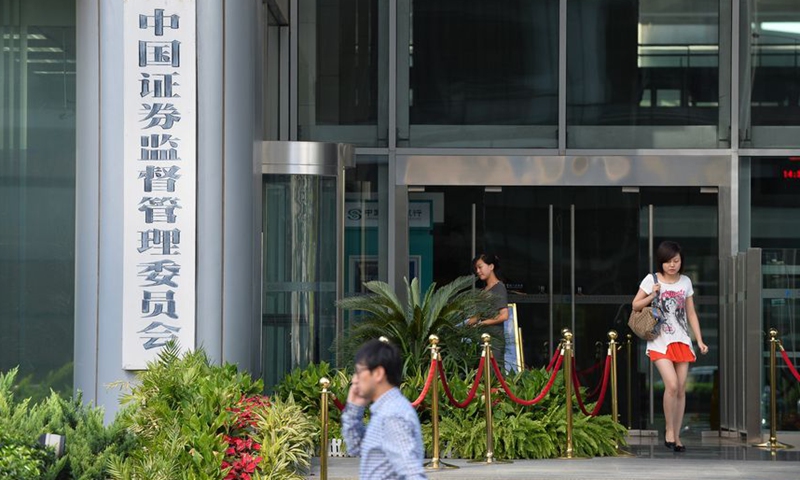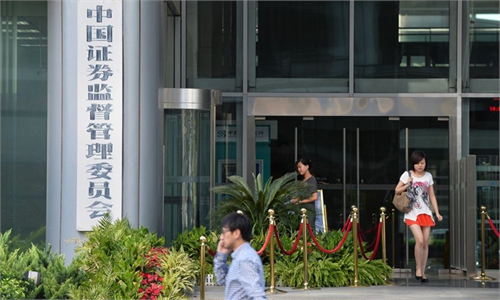
File photo shows the entrance of the China Securities Regulatory Commission (CSRC) in Beijing, capital of China. (Photo:Xinhua)
China's top disciplinary bodies on Wednesday announced a special inspection of the country's top stock market regulator to "dig out" corruption, in the latest effort of China's intensifying crackdown campaign on securities crimes, including those involve Chinese companies listed overseas.
China must clean up the securities sector to attract more IPOs on the domestic A-share markets, as overseas listings have become increasingly difficult and risky amid toughened US management, experts said, predicting that fewer Chinese companies will seek foreign listings to avoid risks and controversies faced by Didi Chuxing.
China's two top discipline regulators - the National Commission of Supervision (NCS) and the Central Commission for Discipline Inspection (CCDI) - jointly published a statement on Wednesday morning.
In the statement, they said that the discipline inspection group stationed at the China Securities Regulatory Commission (CSRC) will carry out a special inspection on the CSRC's work from securities issuance to registration, and "dig out" corruption problems behind risk events.
The statement came just hours after the General Office of the Central Committee of the Communist Party of China and the General Office of the State Council jointly issued a guideline, stating that China will take steps to crack down on securities violations.
These steps will include amending the rules that cover Chinese companies' overseas fundraising and IPOs, and increasing the penalties for securities crimes.
Shares in the Chinese mainland gained after these developments on Wednesday. The Shanghai Composite Index rose 0.66 percent, while the Shenzhen Component Index added 1.86 percent. The Nasdaq-like ChiNext board was up 3.57 percent.
The statements were also rolled out shortly after China's top cybersecurity regulator on Sunday ordered app stores to remove ride-hailing app Didi Chuxing, which only held its IPO in the US last week.
Experts said that Didi's case has exposed risks related to Chinese companies listed abroad, which has sounded the alert for Chinese regulators, making them more determined to clear up the lurking risks.
The big data held by Didi poses a potential threat to China's national security if leaked to other countries. Such risks have increased after the US launched the so-called Holding Foreign Companies Accountable Act, which allows access to Chinese companies' audit working papers, Kuang Yuqing, founder of Lens Company Research, told the Global Times on Wednesday.
According to Kuang, the crackdown measures were also rolled out because China needs to counter the impact of the US' act, which will restrict mainland companies' overseas IPOs, he said.
"The A-share markets need further reforms so that they can attract more qualified companies to list locally, and to achieve that goal, the regulators have to clear up the market first by cracking down on financial crimes," he said.
Zhang Liying, a research fellow at a domestic securities firm, told the Global Times that the regulators' focus on securities violations is unlikely a direct result of Didi's case, but is in line with China's overall security market reforms.
"Especially after the registration-based IPO system is implemented, management capacity will decide how healthy China's capital markets can be," she said.
Fewer Chinese companies will now seek overseas IPOs, the experts said.
"The threshold for such IPOs will be higher because there will be more restrictions," said Xi Junyang, a professor at the Shanghai University of Finance and Economics. "This will push them to prefer mainland bourses."
He also told the Global Times that companies will be afraid of facing the same problems as Didi, such as a slumping share price or a hit to revenue.




